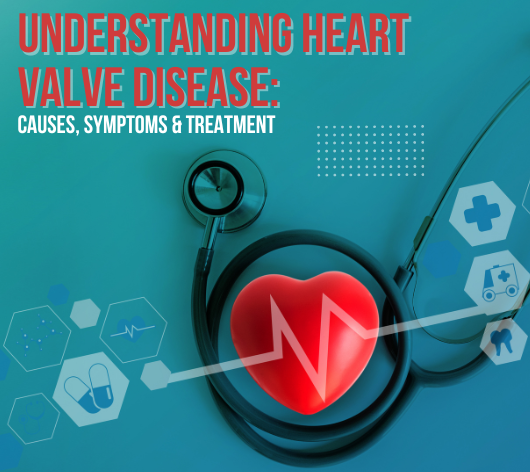
Understanding Heart Valve Disease: Causes, Symptoms, and Treatment Options
Introduction
Heart valve disease is a condition that affects the valves within the heart, disrupting the normal flow of blood. While some cases may be mild and manageable, others can lead to serious complications if left untreated. In this blog, we'll delve into the causes, symptoms, and treatment options for heart valve disease to provide a comprehensive understanding of this condition. Seeking the best Chest pain treatment in Greater Kailash is crucial for effectively managing heart valve disease and preventing complications.
What is Heart Valve Disease?

The human heart has four valves—mitral, tricuspid, aortic, and pulmonary—that open and close to regulate blood flow in and out of the heart's chambers. When these valves become damaged or diseased, they may not function properly, causing blood to flow inefficiently. This condition is known as heart valve disease.
Causes of Heart Valve Disease:
Heart valve disease can be caused by various factors, including:
- Age: With age, wear and tear on the heart valves can occur, leading to degenerative valve disease.
- Congenital Defects: Some individuals are born with abnormalities in their heart valves, predisposing them to valve disease later in life.
- Rheumatic Fever: Untreated streptococcal infections, such as rheumatic fever, can damage heart valves.
- Infections: Endocarditis, an infection of the inner lining of the heart, can damage the heart valve.
- Other Conditions: Conditions such as coronary artery disease, hypertension, and connective tissue disorders can also contribute to valve disease.
Symptoms of Heart Valve Disease:
The symptoms of heart valve disease may vary depending on the severity and type of valve affected. Common symptoms include:
- Shortness of breath
- Chest pain or discomfort
- Fatigue
- Palpitations or irregular heartbeat
- Swelling of the ankles, feet, or abdomen
Diagnosis and Treatment Options:
Diagnosis of heart valve disease typically involves a combination of medical history review, physical examination, and diagnostic tests, including echocardiography, electrocardiogram (ECG), and cardiac catheterization.
Treatment options for heart valve disease depend on several factors, including the severity of the condition, the type of valve affected, and the patient's overall health. Treatment may include:
- Medications: Medications can help manage symptoms and prevent complications.
- Lifestyle Modifications: Adopting a heart-healthy lifestyle, including regular exercise and a balanced diet, can help manage the progression of the disease.
- Surgery: In severe cases, surgical intervention may be necessary to repair or replace the damaged heart valve.
- Transcatheter Procedures: Minimally invasive procedures, such as transcatheter valve repair or replacement, may be an option for some patients.
Conclusion:
Heart valve disease is a serious condition that requires timely diagnosis and appropriate management to prevent complications. By understanding the causes, symptoms, and treatment options for heart valve disease, individuals can take proactive steps to protect their heart health. If you experience any symptoms of heart valve disease, it's essential to consult a healthcare professional for evaluation and guidance.
Remember, early detection and intervention can make a significant difference in the outcome of heart valve disease. Prioritise your heart health and take proactive steps towards a healthier tomorrow.
Frequently Asked Questions (FAQs) About Heart Valve Disease:
What is heart valve disease?
- Heart valve disease occurs when one or more of the heart's valves do not function properly, disrupting blood flow within the heart.
What causes heart valve disease?
- Heart valve disease can be caused by ageing, congenital defects, infections, rheumatic fever, or other underlying heart conditions.
What are the symptoms of heart valve disease?
- Symptoms may include shortness of breath, chest pain, fatigue, palpitations, and swelling of the ankles or abdomen.
How is heart valve disease diagnosed?
- Diagnosis involves a physical exam, medical history review, and diagnostic tests such as echocardiography, electrocardiogram (ECG), and cardiac catheterization.
What are the treatment options for heart valve disease?
- Treatment may include medication, lifestyle changes, and, in severe cases, surgical intervention to repair or replace the damaged valve.
